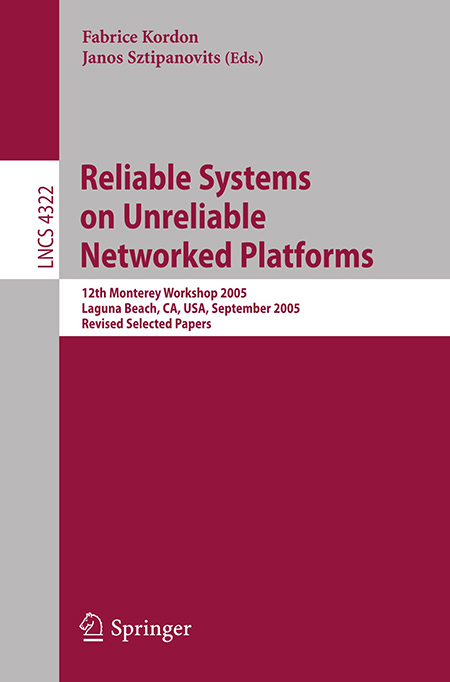Yr_2005_12th - Monterey Workshop
12th Monterey Workshop: Workshop on Networked Systems: Realization of reliable systems on top of unreliable networked platforms (2005)
Networked computing is increasingly becoming the universal integrator for large-scale systems in defense and industry. In addition, new generation of wireless networked embedded systems rapidly create new technological environments that imply complex interdependencies amongst all layers of societal-scale critical infrastructure, such as transportation, energy distribution and telecommunication.
This trend makes reliability and safety of networked computing a crucial issue and a technical precondition for building software intensive systems that are robust, fault tolerant, and highly available. The workshop focused on new, promising directions in achieving high software and system reliability in networked systems.
It was the 12th in a series of workshops, initiated in 1993 and devoted to exploring the critical problems associated with cost-effective development of high-quality software systems. The Monterey workshops have a rich history of bringing together both American and European scientists that share a common interest in seeing that software development research serves as a catalyst for practical advances in next-generation software-intensive systems.
The last few years the workshop has been held alternately in Europe and the United States. This year, the workshop was held in Laguna Beach, CA during September 22 - 24. The workshop was chaired by Prof. Fabrice Kordon of the Université Pierre & Marie Curie, France and Prof. Janos Sztipanovits of Vanderbilt University, USA.
Download the Proceedings here.
Workshop Topics
Software is the new infrastructure of the information age. It is fundamental to economic success, scientific and technical research and national security. Our current ability to construct the large and complex software systems demanded for continued economic progress is inadequate.
The workshop discussed a range of challenges in networked systems that require further major advances in software and systems technology:
- System Integration and Dynamic Adaptation. A new challenge in networked systems is that stable application performance needs to be maintained in spite of the dynamically changing communication and computing platforms. Consequently, the run-time architecture must include active control mechanisms for adapting the Please purchase PDF Split-Merge on www.verypdf.com to remove this watermark. Preface VII system/software components to changing conditions. Global system characteristics need to be achieved by increased run-time use of reflection (systems that utilize their own models), advanced interface modeling, self-adaptation, and selfoptimization.
- Effects of Dynamic Structure. The structure of networked systems is complex and highly dynamic. Because systems are formed by ad hoc networks of nodes and connections, they lack fine-grain determinism for end-to-end behaviors that span subsystem and network boundaries. In addition, there are end-to-end system qualities such as timeliness and security that can only be evaluated in this dynamically integrated context.
- Effects of Faults. Faults and disruptions in the underlying communication and computing infrastructure are the normal events. Since well-understood techniques for fault-tolerant computing, such as n-modular redundancy, are not applicable in the dynamically changing networked architecture, new technology is required for building safe and reliable applications on dynamic, distributed platforms.
- Design for Reliability. Although there are varieties of metrics and established practices for characterizing the expected failure behavior of a system after it is fielded and there are established practices for specifying the desired reliability of a system, the evaluation of system or software reliability prior to fielding is a significant problem.
- System Certification. The process for certifying that a system meets specified reliability goals under the range of conditions expected in actual use currently involves exhaustive analysis of a system, including its development history and extensive testing. Current methods do not give systems engineers the confidence they would like to have in concluding that a system will have particular reliability characteristics.
- Effects of Scale. Another risk that overlays all proposed solutions is scale. Scale also addresses both run-time and design-time concerns. Typically, demonstrations are the convincing drivers to technology adoption. Demonstrations of new technologies however are usually small-scale, focused efforts. It is an open problem how to scale up a demonstration that addresses the number of nodes and connections, and the number of software developers, analysts, and integrators to provide enough proof to justify technology transition.
These challenges are exaggerated in networked-embedded software systems, where computation and communication are tightly integrated with physical process.
Steering Committee
The Monterey Workshop Community has a long history of productive, high-quality workshops, directed by an international steering committee consisting of leaders in the field of software engineering and formal methods under the visionary leadership of David Hislop from the Army Research Office:
- Egidio Astesiano, University of Genova, Italy
- Manfred Broy, Technical University Munich, Germany
- David Hislop, Army Research Office
- Hermann Kopetz, Vienna University of Technology
- Fabrice Kordon, University of Pierre & Marie Curie, Paris, France
- Luqi, Naval Postgraduate School, Monterey, California
- Zohar Manna, Stanford University
- Janos Sztipanovits, Vanderbilt University
Technical Program Committee
The program chairs were assisted by an international program committee consisting of the following researchers from the United States and Europe.
- Carlos Delgado, Kloos University Carlos III of Madrid, Spain
- Bertil Folliot, University of Pierre & Marie Curie, Paris, France
- Tom Henzinger, Ecole Polytechnique Federale de Lausanne, Switzerland
- Kane Kim, University of California at Irvine
- Insup Lee, University of Pennsylvania
- Chenyang Lu, Washington University
- Tom Maibaum, King's College, London, UK
- Ugo Montanari, University of Pisa, Italy
- Laurent Pautet, Telecom Paris
- Wolfgang Pree, Univ. Salzbourg
- Doug Schmidt, Vanderbilt University - ISIS, USA

Fabrice Kordon, Janos Sztipanovits (Eds.): Reliable Systems on Unreliable Networked Platforms, 12th Monterey Workshop 2005, Laguna Beach, CA, USA, September 22-24, 2005. Revised Selected Papers, Springer LNCS 4322, ISBN 978-3-540-71155-1. DOI: https://doi.org/10.1007/978-3-540-71156-8

